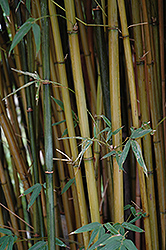It's all about ...
plants

Candy Cane Bamboo
Himalayacalamus falconeri 'Damarapa'
Height: 20 feet
Spread: 4 feet
Sunlight:
![]()
![]()
Hardiness Zone: 8b
Other Names: Damarapa Bamboo
Description:
A striking ornamental bamboo; culms display vivid random stripes of green, yellow, pink, orange, and red to lavender tones; colors are best when grown in indirect sunlight; protect from hot afternoon sun; one of the most beautiful clumping bamboos
Ornamental Features
Candy Cane Bamboo's attractive pointy compound leaves remain green in colour throughout the year on a plant with a vase-shaped habit of growth.
Landscape Attributes
Candy Cane Bamboo is a dense herbaceous evergreen perennial with an indistinguished habit of growth. Its relatively fine texture sets it apart from other garden plants with less refined foliage.
This is a relatively low maintenance plant, and usually looks its best without pruning, although it will tolerate pruning. It has no significant negative characteristics.
Candy Cane Bamboo is recommended for the following landscape applications;
- Accent
- Mass Planting
- Hedges/Screening
- General Garden Use
Planting & Growing
Candy Cane Bamboo will grow to be about 20 feet tall at maturity, with a spread of 4 feet. It grows at a fast rate, and under ideal conditions can be expected to live for approximately 15 years. As an evegreen perennial, this plant will typically keep its form and foliage year-round.
This plant does best in partial shade to shade. It requires an evenly moist well-drained soil for optimal growth. It is not particular as to soil type or pH. It is somewhat tolerant of urban pollution, and will benefit from being planted in a relatively sheltered location. This is a selected variety of a species not originally from North America. It can be propagated by division; however, as a cultivated variety, be aware that it may be subject to certain restrictions or prohibitions on propagation.
This plant is not reliably hardy in our region, and certain restrictions may apply; contact the store for more information.
